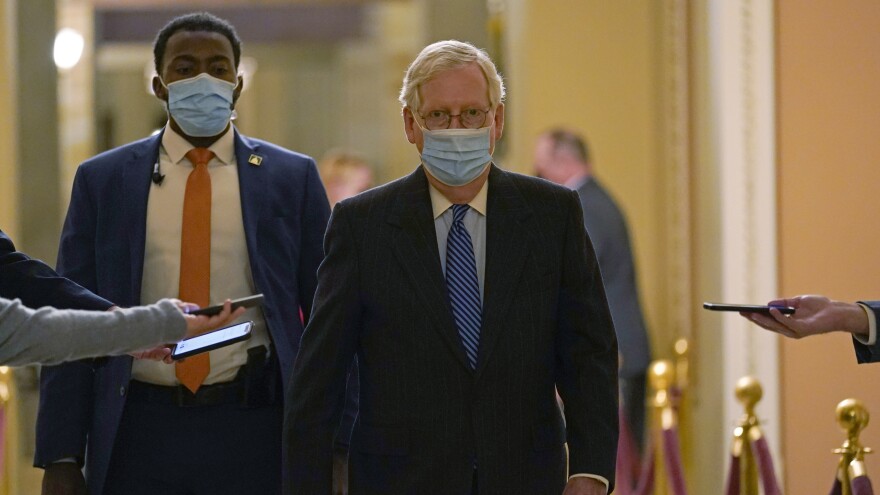Congressional chaos shows no signs of relenting in the final days of 2020.
Senate Majority Leader Mitch McConnell, R-Ky., is moving ahead with a plan Wednesday to avoid a public rift within the GOP over stimulus payments demanded by President Trump ahead of a critical runoff election in Georgia.
The Senate is set to begin a complicated plan that Democrats say is deliberately meant to avoid a direct up-or-down vote on the $2,000 relief payments that passed the House earlier this week. On Tuesday, McConnell moved to tie the direct payments to Trump's demands to investigate alleged voter fraud and to repeal a decades-old law that would open the door for lawsuits against social media companies for the content they choose to leave up or take down.
Senate Minority Leader Chuck Schumer, D-N.Y., has rejected that plan.
"What we're seeing right now is Leader McConnell trying to kill the checks — the $2,000 checks desperately needed by so many American families — by tying them completely to partisan provisions that have absolutely nothing to do with helping struggling families across the country," Schumer told reporters in the Capitol. "The only way to deliver the $2,000 survival checks to Americans is to pass the bipartisan House-passed bill."
Complicating matters further, the checks are also politically entwined with a must-pass veto-override on a massive defense bill.
The chaotic scramble comes as McConnell attempts to shield GOP members from difficult votes in the days before control of the Senate is determined in Georgia. McConnell attempted to explain his plan on Tuesday by saying Trump tied the issues together, so the Senate will, too.
"Those are the three important subjects the president has linked together," McConnell said. "This week, the Senate will begin a process to bring these three priorities into focus."
The plan is for the Senate to start votes on Wednesday to override Trump's veto of a hugely bipartisan defense bill over his demand to repeal the liability protections that benefit social media companies. Sen. Bernie Sanders, I-Vt., has suggested he will filibuster that measure until the Senate votes on the $2,000 payments.
"Two-thirds of the House voted to provide those $2,000 checks," Sanders told reporters in the Capitol. "The overwhelming majority of Americans want that, Trump wants it, Biden wants it, Pelosi wants it, Schumer wants it. Let's have a vote, and let's pass this damn thing."
Sanders has little ability to stop the eventual vote on the veto override, but a filibuster could slow the process and force a vote on New Year's Eve.
The complicated process comes as a growing number of Republicans have come out in favor of the checks, including Georgia Sens. Kelly Loeffler and David Perdue who are both facing Jan. 5 runoff elections. The outcome of the Georgia races will determine control of the Senate.
Perdue and Loeffler both embraced the $2,000 payments after Trump threatened to block a massive government spending and coronavirus relief bill that included smaller, $600 checks for eligible Americans.
The two have campaigned as Trump allies and have benefitted from the president's support. But expanded stimulus checks are not widely popular among Republicans, in part because the payments could cost around $464 billion, according to a nonpartisan congressional budget estimate.
Copyright 2020 NPR. To see more, visit https://www.npr.org. 9(MDAyNDY5MjM1MDEyODE2MzMyMTZmZDQwMg001))






